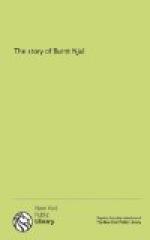This gift was looked upon as something “uncanny,” and it leads us at once to another class of men, whose supernatural strength was regarded as a curse to the community. These were the Baresarks. What the hamrammir men were when they were in their fits the Baresarks almost always were. They are described as being always of exceeding, and when their fury rose high, of superhuman strength. They too, like the hamrammir men, were very tired when the fits passed off. What led to their fits is hard to say. In the case of the only class of men like them nowadays, that of the Malays running a-muck, the intoxicating fumes of bangh or arrack are said to be the cause of their fury. One thing, however, is certain, that the Baresark, like his Malay brother, was looked upon as a public pest, and the mischief which they caused, relying partly no doubt on their natural strength, and partly on the hold which the belief in their supernatural nature had on the mind of the people, was such as to render their killing a good work.
Again, the Northman believed that certain men were “fast” or “hard”; that no weapons would touch them or wound their skin; that the mere glance of some men’s eyes would turn the edge of the best sword; and that some persons had the power of withstanding poison. He believed in omens and dreams and warnings, in signs and wonders and tokens; he believed in good luck and bad luck, and that the man on whom fortune smiled or frowned bore the marks of her favour or displeasure on his face; he believed also in magic and sorcery, though he loathed them as unholy rites. With one of his beliefs our story has much to do, though this was a belief in good rather than in evil. He believed firmly that some men had the inborn gift, not won by any black arts, of seeing things and events beforehand. He believed, in short, in what is called in Scotland “second sight”. This was what was called being “forspar” or “framsynn,” “foretelling” and “foresighted “. Of such men it was said that their “words could not be broken”. Njal was one of these men; one of the wisest and at the same time most just and honourable of men. This gift ran in families, for Helgi Njal’s son had it, and it was beyond a doubt one of the deepest-rooted of all their superstitions.
SOCIAL PRINCIPLES.
Besides his creed and these beliefs the new settler brought with him certain fixed social principles, which we shall do well to consider carefully in the outset.... First and foremost came the father’s right of property in his children. This right is common to the infancy of all communities, and exists before all law. We seek it in vain in codes which belong to a later period, but it has left traces of itself in all codes, and, abrogated in theory, still often exists in practice. We find it in the Roman law, and we find it among the Northmen. Thus it was the father’s right to rear his children




